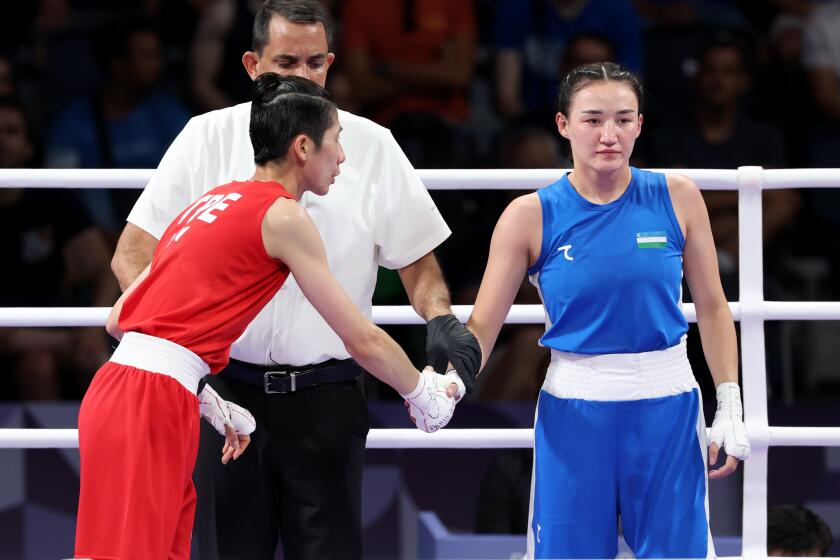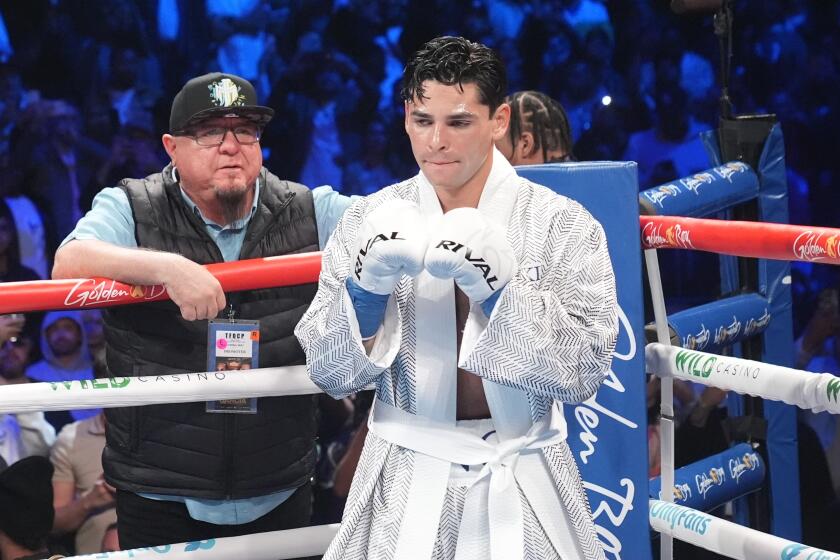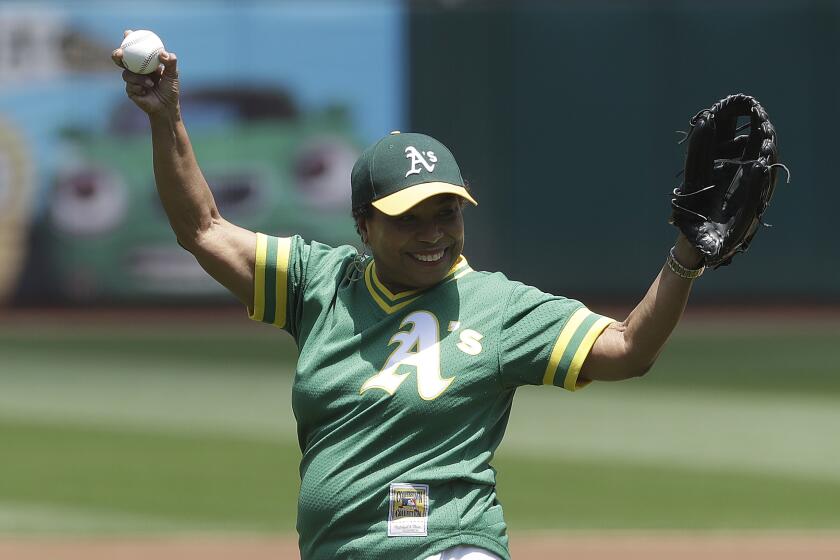In Bangkok, ‘Influential Men’ Settle Their Scores Efficiently : Thai Godfathers Get Rubbed Out Chicago-Style
Chaiwat Palangwattanakij, a boxing promoter and rising Thai gambling boss, got his in a ringside shoot-out this month and went out in gangland style.
Police frisked hundreds of his men, rivals and the merely curious who packed a Buddhist temple for the funeral rites.
Solemn it was not. Five boxers put on exhibition bouts in front of the coffin. In Chinese tradition, paper models of material goods that the deceased might need in the afterlife were ceremoniously burned. Chaiwat’s included a one-third-scale model of a white Mercedes sedan, complete with four paper gunmen.
Mourners plowed into a huge feast of Chinese delicacies, then followed the coffin in a cortege, led by a police escort, to the burial site.
‘Measuring the Shoes’
The festivities marked the end for another chao por , a godfather of the seamy Thai underworld. The 42-year-old Chaiwat, police officials said, had been “measuring the shoes” of a rival boss, preparing to move up in a world where crime means money, money means power and guns and influence protect the trade. Beneath its soaring temples and behind its ready smiles, Bangkok is a rough, anything-goes city where gangsters settle scores with cold efficiency.
“For many,” wrote a columnist of The Nation, a Bangkok newspaper, “the first time they heard of Chaiwat’s name was their last.”
But even if they don’t know their names, Thais know that those they call “influential men” command a fearful respect. Violence follows their steps. At least five have been killed in the past three years.
Chaiwat was sitting at ringside of Lumpini Stadium, enjoying a night of traditional Thai kick-boxing, when he was shot. Just before the bell rang for the fifth round of a bout, a gunman shot him in the face, then three more times in the body. As 8,000 fans threw themselves to the ground or bolted for the exits of the old stadium, Chaiwat’s bodyguards returned the fire.
The gunman was wounded, two fans died in the crossfire and others were trampled in the stampede. At least 50 shots were fired, police estimated. “It’s Texas!” a Bangkok newspaper proclaimed in its report.
The mortally wounded Chaiwat was hustled to a hospital where he died three days later. His bodyguards, who kept watch in the passageway, were later identified as off-duty police and military men, setting off another uproar.
“By permitting or tolerating the big bosses to use police and army personnel as their private bodyguards, the police and army indirectly lend respectability to the chao por ,” editorialized The Nation.
“We have ordered our men not to help or have any relations with influential men,” Gen. Pow Sarasin, the national police chief, responded, “never to go to any social party or birthday party held by them.”
In the Chaiwat killing, police have arrested the manager of a rival boxing stable on charges of placing the assassination contract, based on information supplied by the wounded gunman. But the suspect is believed to be only a middleman, according to published reports, which point a finger at Klaew Thanikul, reputedly the No. 1 chao por in Bangkok and the suspect’s boss.
Questioned by reporters, Klaew responded cavalierly: “If I really wanted to (kill Chaiwat), I don’t have to make any order. I could just say, ‘I don’t want to walk with him’ and he would be in big trouble.”
Klaew hosted the funeral rites for his rival and one-time protege.
Godfathers are the kingpins of crime here and hired guns are the enforcers.
“A chao por might have 10 bodyguards,” a high-ranking officer of the police department’s Central Investigation Bureau said in an interview. “If the godfather wants someone killed, he’ll tell one of his bodyguards and give him the money to get it done. Everybody takes a cut as the contract is passed down.”
While the godfather might lay out $4,000 initially, the man who actually pulls the trigger may get only $800, the officer said.
The first step on the crime ladder is even lower, he pointed out.
“Most of these chao por start out as nothing,” the officer related. “They may be laborers or waiters. He could start as a young kid whose family needs money. He takes a job in a gambling den, fetching drinks for the players. Then maybe he gets them drugs. Later he gets greedy, figuring--why should he run errands for 3,000 baht ($120) a month when he could go out on his own?
“He’ll get a big shot to sponsor him. Then, once he does his own business, he needs gunmen to protect him. Now he becomes a young chao por , and perhaps a threat to his sponsor. He takes away his sponsor’s old customers. Then we have trouble.”
At the top, the handful of godfathers who run crime in Bangkok become the “influential men,” but can never rise above their roots, the officer added. “They have big cars and mansions, but that is just to hide their real business. They rarely stay there. They sleep at their mistress’ house or at their gambling den. They have to take care of business.”
Business includes paying off a retinue of watchers, neighborhood eyes and ears, to sound the alert if police or rivals are nosing around the area. The watchers, the officer insisted, may outwardly show respect to the chao por , and talk about him as a Robin Hood, “but they know he’s a jerk and they know his money is dirty.”
The godfathers, popularly described as gamblers and the owners of illegal gambling dens, operate all the traditional rackets--drugs, smuggling, gambling, prostitution and bars, he said.
“They peddle drugs because it’s big money, and they need money to pay gunmen to protect their interests and also to build influence,” the officer explained. “Money is power. They’ll donate to charities run by important businessmen, military officers or politicians. They want to be known by important people. These people can protect them.
‘A Lot of Cheating’
“They also have to look after the families of their men who get sent to jail or killed. And they need gunmen for their drug businesses because there’s a lot of cheating in drugs.” The result is an organization of gunmen and watchers, influential friends and bodyguards. When a chao por enters a restaurant, he is preceded by men who check out the building like secret service agents, then clear an area for the godfather to dine in relative peace.
Their greatest threats are rivals, or unhappy customers of their drug and gambling deals. “Sometimes a boss can’t make good his losses at a gambling den,” the officer pointed out. “The customers will pool their money, hire an outside gun and have him killed.”
According to police officials, there is no crime directorate in Bangkok. Each chao por operates in a particular area, usually developed around a safehouse where drugs or contraband can be stored. Sometimes one boss may let another use his safehouse for temporary storage--at a price--but usually they are competitive free-lancers. Encroachment on business or territory leads to violence. So can mere slights.
For example, the officer from the Central Investigation Bureau told a story of a chao por who ordered an assassination at the behest of a friend who got into an argument over a parking spot.
The bigger they get, the more likely the fall, the officer said: “Once you become rich in that business, you’d better prepare to die.”
More to Read
Go beyond the scoreboard
Get the latest on L.A.'s teams in the daily Sports Report newsletter.
You may occasionally receive promotional content from the Los Angeles Times.










